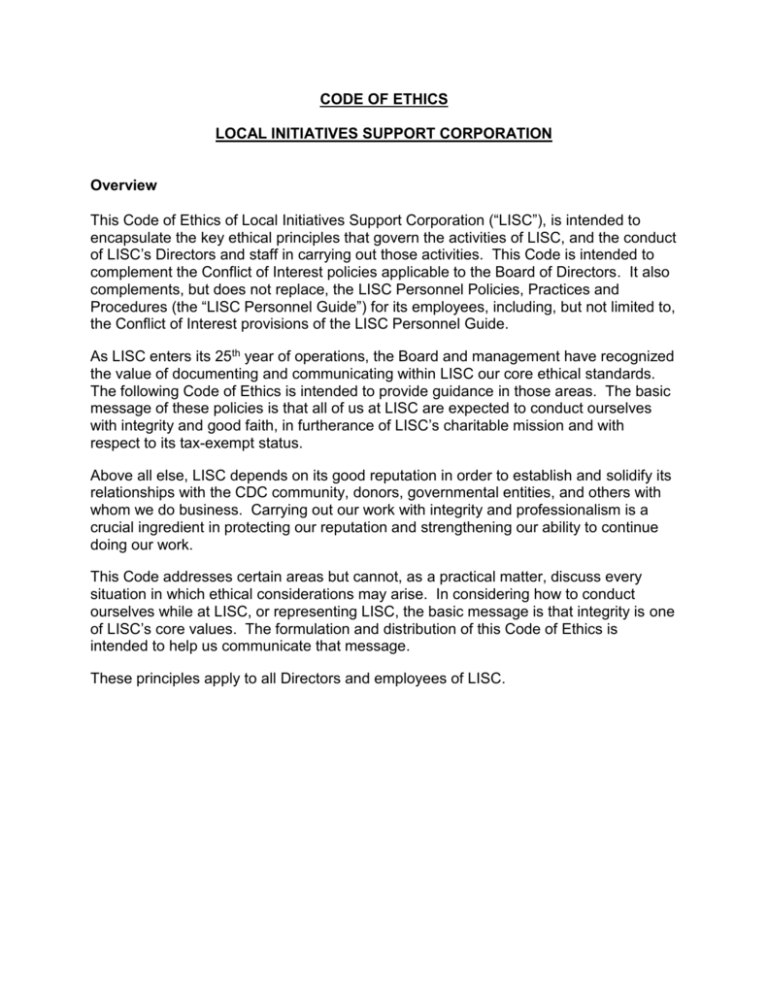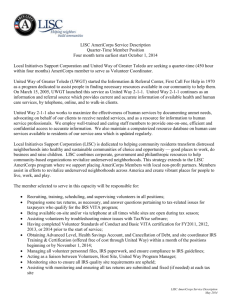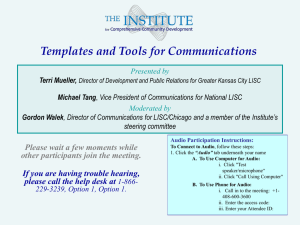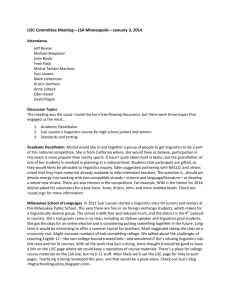CODE OF ETHICS
advertisement

CODE OF ETHICS LOCAL INITIATIVES SUPPORT CORPORATION Overview This Code of Ethics of Local Initiatives Support Corporation (“LISC”), is intended to encapsulate the key ethical principles that govern the activities of LISC, and the conduct of LISC’s Directors and staff in carrying out those activities. This Code is intended to complement the Conflict of Interest policies applicable to the Board of Directors. It also complements, but does not replace, the LISC Personnel Policies, Practices and Procedures (the “LISC Personnel Guide”) for its employees, including, but not limited to, the Conflict of Interest provisions of the LISC Personnel Guide. As LISC enters its 25th year of operations, the Board and management have recognized the value of documenting and communicating within LISC our core ethical standards. The following Code of Ethics is intended to provide guidance in those areas. The basic message of these policies is that all of us at LISC are expected to conduct ourselves with integrity and good faith, in furtherance of LISC’s charitable mission and with respect to its tax-exempt status. Above all else, LISC depends on its good reputation in order to establish and solidify its relationships with the CDC community, donors, governmental entities, and others with whom we do business. Carrying out our work with integrity and professionalism is a crucial ingredient in protecting our reputation and strengthening our ability to continue doing our work. This Code addresses certain areas but cannot, as a practical matter, discuss every situation in which ethical considerations may arise. In considering how to conduct ourselves while at LISC, or representing LISC, the basic message is that integrity is one of LISC’s core values. The formulation and distribution of this Code of Ethics is intended to help us communicate that message. These principles apply to all Directors and employees of LISC. I. Personal and Professional Integrity All LISC staff and Board members shall act with honesty, integrity and openness in all their dealings as LISC representatives. LISC promotes a working environment that values respect, fairness and integrity. II. Mission LISC’s mission is to help “resident-led, community-based development organizations transform distressed communities and neighborhoods into healthy ones-- good places to live, do business, work and raise families. By providing capital, technical expertise, training and information, LISC supports the development of local leadership and the creation of affordable housing, commercial, industrial and community facilities, businesses and jobs. We help neighbors build communities.” This mission is at the core of why LISC was formed and how it does its business today. In carrying out their responsibilities, LISC Directors and staff should be cognizant of LISC’s mission. III. Conflicts of Interest All Directors and employees of LISC should be scrupulous in avoiding a conflict of interest with regard to LISC interests, and should also be sensitive to those situations in which there could be an appearance of a conflict of interest. Although more specific guidance is available in the Board of Directors Conflict of Interest Policy, and in the Conflict of Interest section of the LISC Personnel Guide, the following general concepts should help all of us be more aware of this area: A “conflict of interest” exists whenever an individual’s private interest interferes or conflicts in any way with the interest of LISC. A conflict situation can arise when an employee takes actions or has interests that may make it difficult to perform his or her LISC work objectively and effectively or, in the case of a Director, to serve objectively and effectively on the LISC Board. Conflicts of interest may also arise when an employee, or members of his or her family, receives improper personal benefits as a result of his/her position at LISC, whether received from LISC or a third party. If a Director or an employee has any questions about whether a particular situation may present a conflict of interest, he or she should contact the General Counsel or the Deputy General Counsel of LISC to discuss the situation. IV. Confidentiality Directors and employees of LISC must maintain the confidentiality of information entrusted to them in their official capacity at LISC, except when the President and CEO of LISC otherwise authorizes its disclosure, or as otherwise required by laws, regulations or legal proceedings. A violation of this trust is a serious matter. Whenever feasible, Directors and employees should consult the General Counsel if they believe they have a question as to whether information they wish to disclose is of a confidential -2- nature, or if they have a legal obligation to disclose confidential information. As a general concept, confidential information includes all non-public information that might be of use to competitors or the disclosure of which might otherwise be harmful to LISC or its customers. V. Legal Compliance All employees of LISC should respect and comply with all of the laws, rules and regulations of the United States, states, counties, cities and jurisdictions in which LISC conducts its business and the laws, rules, and regulations which are applicable to LISC. No employee shall knowingly participate in any transaction or activity which they have reasonable cause to believe may violate, or may aid others to violate any such law, rule or regulation. This Code of Ethics does not summarize all laws, rules and regulations and policies applicable to LISC and it employees. Please consult the Vice President for Human Resources or the General Counsel for questions on specific laws, rules and regulations. VI. Governance The Board is responsible for setting the mission and strategic direction of the organization and oversight of the finances, operations, and policies of the organization. The Board ensures that its members have the requisite skills and experience to carry out their duties and that all members understand and fulfill their governance duties acting for the benefit of the organization and its public purpose. LISC has adopted Conflict of Interest policies for its Board and its staff. Those policies are attached to this Code of Ethics. The Board Conflict of Interest policy is intended to insure appropriate disclosure of financial relationships between any organization of which a LISC Board member is an employee or director, and sets forth the procedures to be following in the event of these or any other conflicts of interest or potential conflicts of interest. The Board is responsible for the hiring, firing, and regular review of the performance of the Chief Executive Officer, and ensures that the compensation of the Chief Executive Officer, and other members of senior management, is reasonable, and appropriate. The Board also reviews and approves the compensation of other LISC officers, and the compensation policies for the organization as a whole, in the context of the compensation structure approved by the Board. The Chief Executive Officer and appropriate staff shall provide the Board and its Committees with timely and comprehensive information so that the Board and the respective Committees can effectively carry out their responsibilities. -3- VII. Responsible Stewardship LISC manages its funds, and those it receives from donors and lenders, responsibly and prudently. Its management of such funds takes into account the following considerations: Spending a reasonable percentage of its annual budget on programs in pursuance of its mission; Spending an adequate amount on administrative expenses to ensure effective accounting systems, internal controls, competent staff, and other expenditures critical to professional management; and Ensuring that all spending practices and policies are fair, reasonable and appropriate to fulfill the mission of the organization. All financial reports shall be factually accurate and complete in all material respects. All financial reports and records, including timesheets, expense reports, income statements, etc. must be accurate, timely and prepared in accordance with the law. All employees are expected to follow the required procedures, within the appropriate time periods, to allow for the maintenance of accurate and complete financial records and the timely production of accurate and complete financial reports. VIII. Openness and Disclosure LISC shall provide comprehensive and timely information to the public and stakeholders as appropriate. Basic informational data about the organization, such as the Form 990 and audited financial statements are available to the public as required by law. All solicitation materials shall accurately represent the organization’s policies and practices and respect the dignity of program beneficiaries. All financial, organizational, and program reports should be accurate in all material respects. IX. Reporting Illegal or Unethical Behavior Reporting Illegal or Unethical Behavior Employees and Directors who suspect or know of violations of this Code or illegal or unethical business or workplace conduct by employees or Directors have an obligation to contact the appropriate supervisor, Vice President for Human Resources, General Counsel, or President and CEO, as appropriate to the circumstance. Accounting Complaints The policy of LISC is to comply with all applicable financial reporting and accounting regulations. If any Director or employee of LISC has unresolved concerns or complaints regarding questionable accounting or auditing matters of the Company, then he or she -4- is encouraged to submit those concerns or complaints to the CFO and / or Chairman of LISC’s Audit Committee, as appropriate. Subject to its legal duties, the Audit Committee and the Board will treat such submissions confidentially. Non-Retaliation LISC prohibits retaliation of any kind against individuals who have made good faith reports or complaints of violations of this Code or other known or suspected illegal or unethical conduct. Employees are encouraged to talk to supervisors or other appropriate personnel about observed illegal or unethical behavior and, when in doubt, about the best course of action in a particular situation. Employees should report violations of this Code of Ethics in accordance with the Complaint Procedure outlined in this code. Discipline for Violation by Employee Failure to comply with the Code will subject an employee, no matter how senior, to discipline that may include counseling, suspension or immediate termination. Disciplinary measures will depend on the circumstances of the violation and will be applied after consultation with the Vice President for Human Resources, General Counsel and President and CEO. Consideration will be given to whether or not a violation is intentional, as well as to the level of good faith shown by an employee in reporting the violation or in cooperating with any resulting investigation or corrective action. X. Program Evaluation The organization regularly reviews program effectiveness and has mechanisms designed to incorporate lessons learned into future programs. The organization is committed to improving program and organizational effectiveness and develops mechanisms to promote learning from its activities and the field. The organization is responsive to changes in its field of activity and is responsive to the needs of its constituencies. XI. Inclusiveness and Diversity LISC shall be fair and inclusive in its hiring and promotion policies and practices. LISC’s diversity policy is set forth more fully in the LISC Personnel Guide. LISC strives for broad representation on its own board and staff, recognizing that without such diversity, the corporation's ability to achieve excellence in its programs would be seriously constrained. LISC is aware diversity benefits everyone and is not only compatible with, but actually promotes, community development success. -5- XII. Fundraising LISC is truthful in its solicitation materials. LISC respects the privacy concerns of individual donors and expend funds consistent with donor intent. In raising funds from the public, LISC respects the right of donors: To be informed of our mission, the way resources will be used and our capacity to use donations effectively for their intended purposes; To be informed of the identity of those serving on LISC’s governing board and to expect the board to exercise prudent judgment in its stewardship responsibilities; To have access to LISC’s most recent financial reports; To receive appropriate acknowledgment and recognition; To be assured that information about their donations is handled with respect and with confidentiality to the extent required by the donor or provided by law; and To feel free to ask questions when making a donation and to receive prompt, truthful and forthright answers. XIII. Record Retention Records should always be retained or destroyed according to applicable requirements. If any employee is aware of an imminent or ongoing investigation, audit, or examination initiated by LISC, by our auditors or attorneys, or by any governmental agency, that employee should retain all documents (including computer records) in his/her custody or control relating to the matter under review. The destruction or falsification of a document in order to impede a governmental investigation, audit or examination may lead to prosecution for obstruction of justice. If an employee is not sure if a document should be retained, or if that employee has any questions on the retention of records, please contact your supervisor or LISC’s General Counsel. XIV. General Guidelines in Providing Grants, Loans or other Financial or Technical Assistance As a provider of financial and technical assistance, LISC has a particular responsibility to carry out these activities in an ethical manner. This includes the following: Having constructive relations with organizations seeking LISC assistance, based on mutual respect and shared goals; Communicating clearly and on a timely basis with potential recipients of LISC assistance; -6- Treating fairly organizations applying for, and organizations receiving, assistance from LISC; Respecting the expertise of organizations with which it does business; Seeking to understand and respect the organizational capacity and needs of organizations seeking assistance from LISC; and Respecting the missions of the organizations seeking its assistance. XV. Amendment and Modification This Code may be amended or modified at any time and without prior notice by LISC within its discretion. -7-








